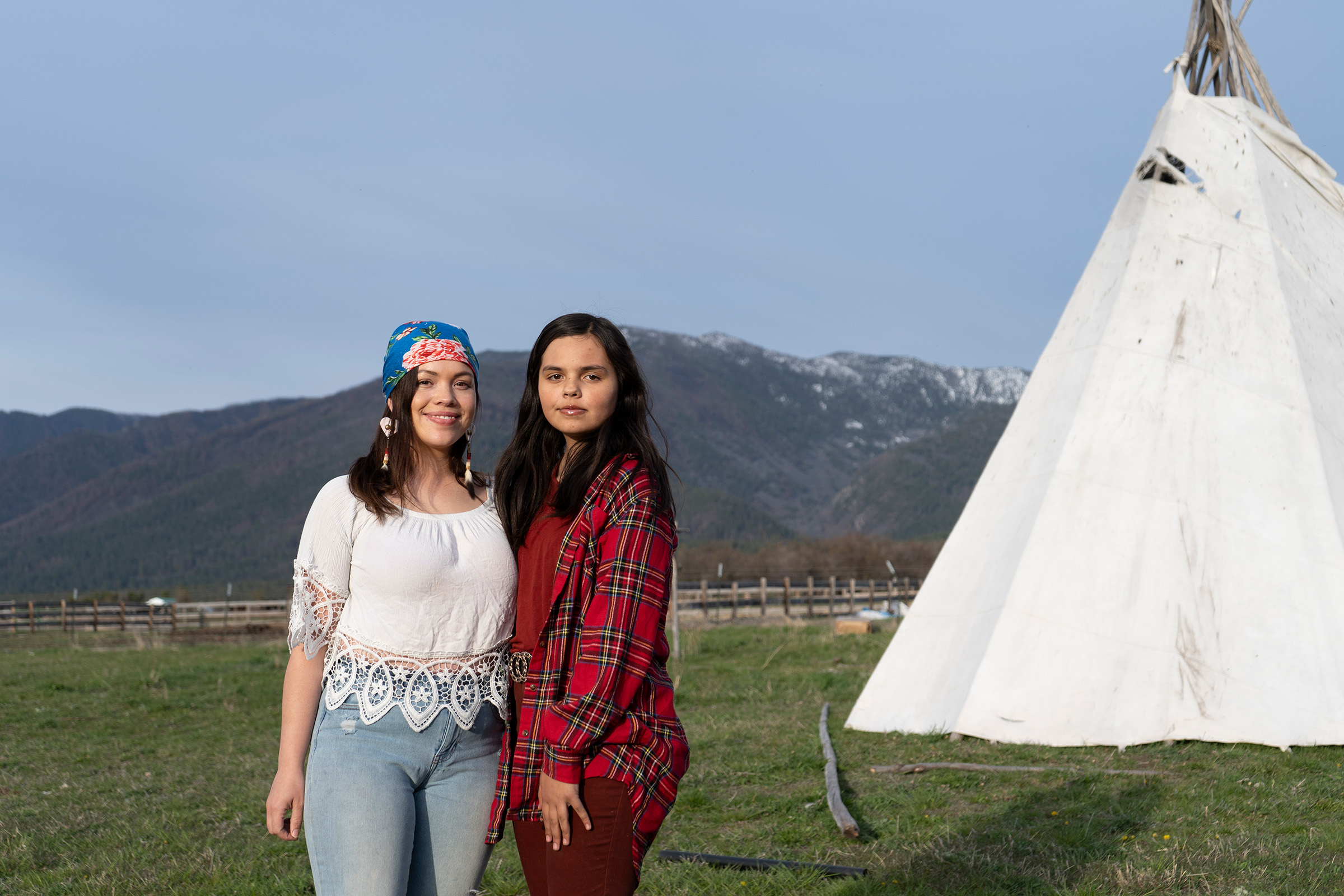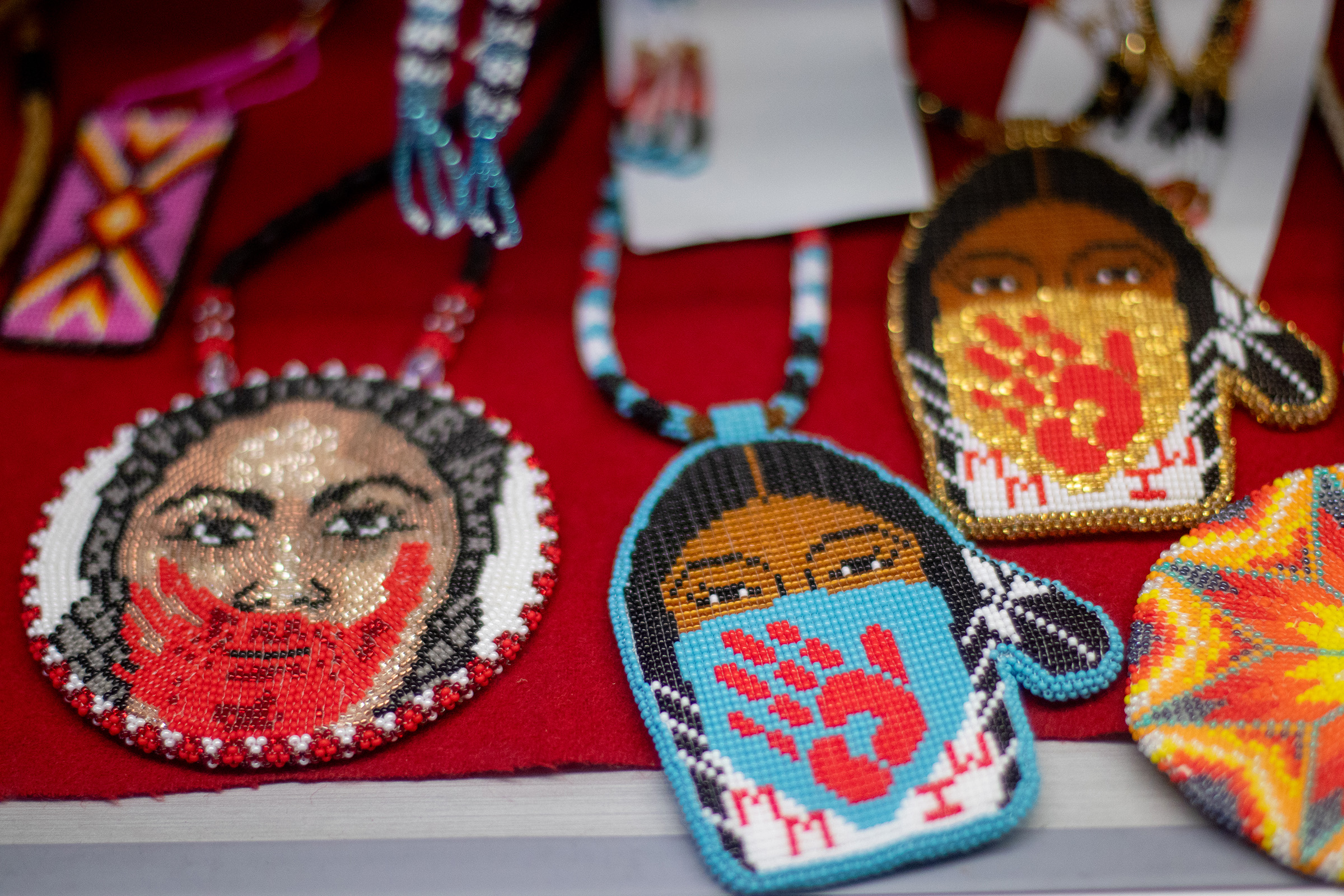Completing the sacred circle
Fort Peck Two-Spirit community restores spaces in the face of legislative attacks
Story by Alex Mitchell. Photos by Ava Rosvold.
As late winter snow swirls outside the Fort Peck Community College, a group continues an arduous months-long campaign huddled around two tables in a student study room.
Though just a week has passed, the campaign has taken the group on an gruesome journey. The group has just saved their boss who hired them. They are now fighting an ogre who stands in the way of glorious treasure.
Sounds of anguish rain out as failed strikes on the ogre bring some members of the party to near-death during battle. But above all else, laughter fills the basement as they continue a fight that lasts hours. Sessions at the tabletop game have gone past midnight. Members of the Two-Spirit Dungeons and Dragons Club joke that in the morning after, they’re largely hungover from the sugar fueling them the night before.
Enlarge

The group began meeting last September. Since that time, they’ve become close friends with so many inside jokes, it can be indecipherable to anyone unfamiliar with the game.
Talena Peterson is at the helm of all those characters as the dungeon master. She approached Kai Teague, who heads the Two-Spirit Collective at the Fort Peck Indian Reservation, about forming a Two-Spirit Dungeons and Dragons group last year.
“I figured I would go to (Teague) because they know people around here who are also queer who you can be free to be yourself around,” Peterson said. “Otherwise, there’s not much if you don’t already know people.”
Peterson, who is Lakota, is finishing an associate degree at the community college. Growing up in small towns across Montana, it was a lonely experience because there were never many visibly queer people. The Dungeons and Dragons club now represents a safe space in a community where many have not felt safe because of neighbors and lawmakers alike.
Enlarge
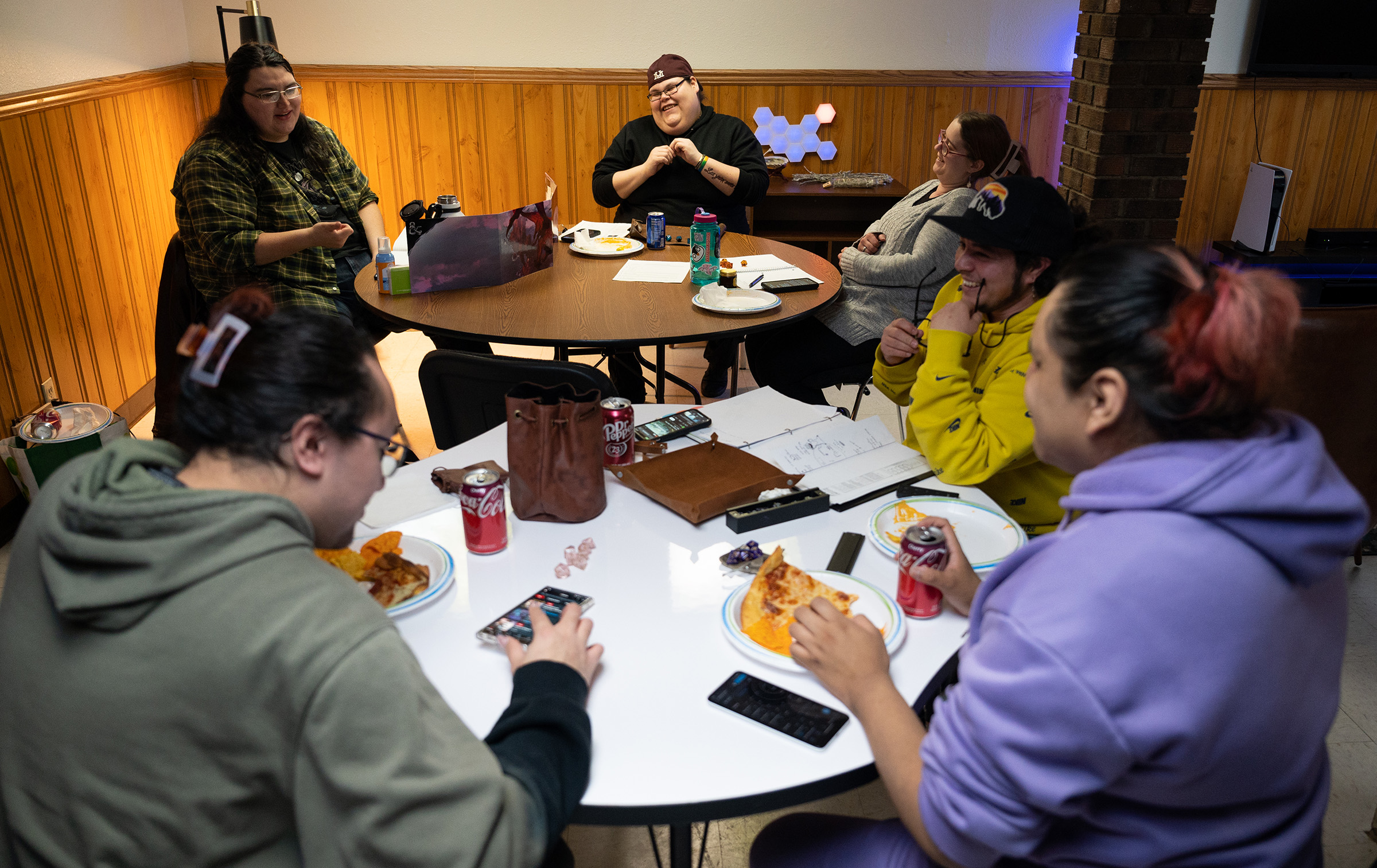
Peterson is Two-Spirit, a term increasingly used for Indigenous peoples who identify as a third gender, or transition between genders. For Peterson, discovering the term was eye-opening. It described how she always felt she fit into multiple gender roles, especially when connecting with her tribe’s traditional roots.
While Peterson figured out she was different when young, she often repressed it. She remembers helping out at the Sundance ceremony, a traditional gathering held during the summer centered on offering prayers for tribal welfare. She helped out in the kitchen, but adults ridiculed her for it.
“Because they saw me as a boy, and they didn’t think a boy should be in the kitchen,” Peterson said. “It’s like at least somebody’s trying to help. You always had to sort of keep your head down and not stick out too much or else people would criticize you.”
Groups like the Two-Spirit Dungeons and Dragons Club play a valuable part in acceptance, giving people a space that hasn’t been there for generations.
Enlarge

Last year, the Montana State Legislature passed Senate Bill 458 – a first-of-its-kind attempt to narrowly define gender as binary, male and female. In October, attorneys representing the Montana Two-Spirit Society and others filed a lawsuit challenging the state law. Plaintiffs are waiting for an updated response from the State by the end of May. Attorneys said the law ignores science and culture and only antagonizes transgender and Two-Spirit people. The lawsuit references several social media posts to illustrate that.
“I won’t use someone’s pronouns for the same reason I won’t talk to a schizophrenic’s imaginary friends,” State Sen. Theresa Manzella (R-Hamilton) said after the bill’s passage.
The co-founder of Montana Two-Spirit Society David Herrera sees the bill as another example of Christian colonization trying to erase tribal history and identity. The new law ignores tribal identities that recognize what was often considered a third, sacred gender. Individuals embodied female and male characteristics and were often revered because they could “walk between both worlds,” Herrera said.
“They were the negotiators,” he said. “They were the medicine people. Or else they’re the name givers. Some of the women were actually warriors and had wives as well. It really varies from tribe to tribe.”
For instance, in the Lakota tribe on the Fort Peck reservation, the term was “winkte,” which is commonly translated as “two-souled person,” indicating male-bodied individuals who adopted feminine roles, clothes and mannerisms. One of the most famous winkte’s name was lost to history, but rode out on a sorrel horse ahead of others to see the future of an impending clash with white soldiers. Clairvoyant, he correctly envisioned a victory for the Lakota in the battle known as the Fetterman Fight in 1866.
Herrera said once colonizers arrived, they labeled the Two-Spirit identity as morally wrong and worked to eradicate its significance. Only in the past couple decades has the identity begun to rise once again.
“Now, more than ever, it’s important for our community to stand up and say ‘We’re here, and we do not deserve to be eradicated,’” said Herrera, who is Mestizo and adopted Blackfeet.
Herrera helped form the Montana Two-Spirit Society in 1996 to give people a space and a voice lost over time. Before forming the group, he said LGBTQ+ Indigenous people didn’t feel welcome in their own homes. With regular assemblies like the Montana Two-Spirit Gathering, which has grown from a few in attendance to nearly a hundred, he hopes Two-Spirit people will feel welcome again and embrace their identity.
Enlarge
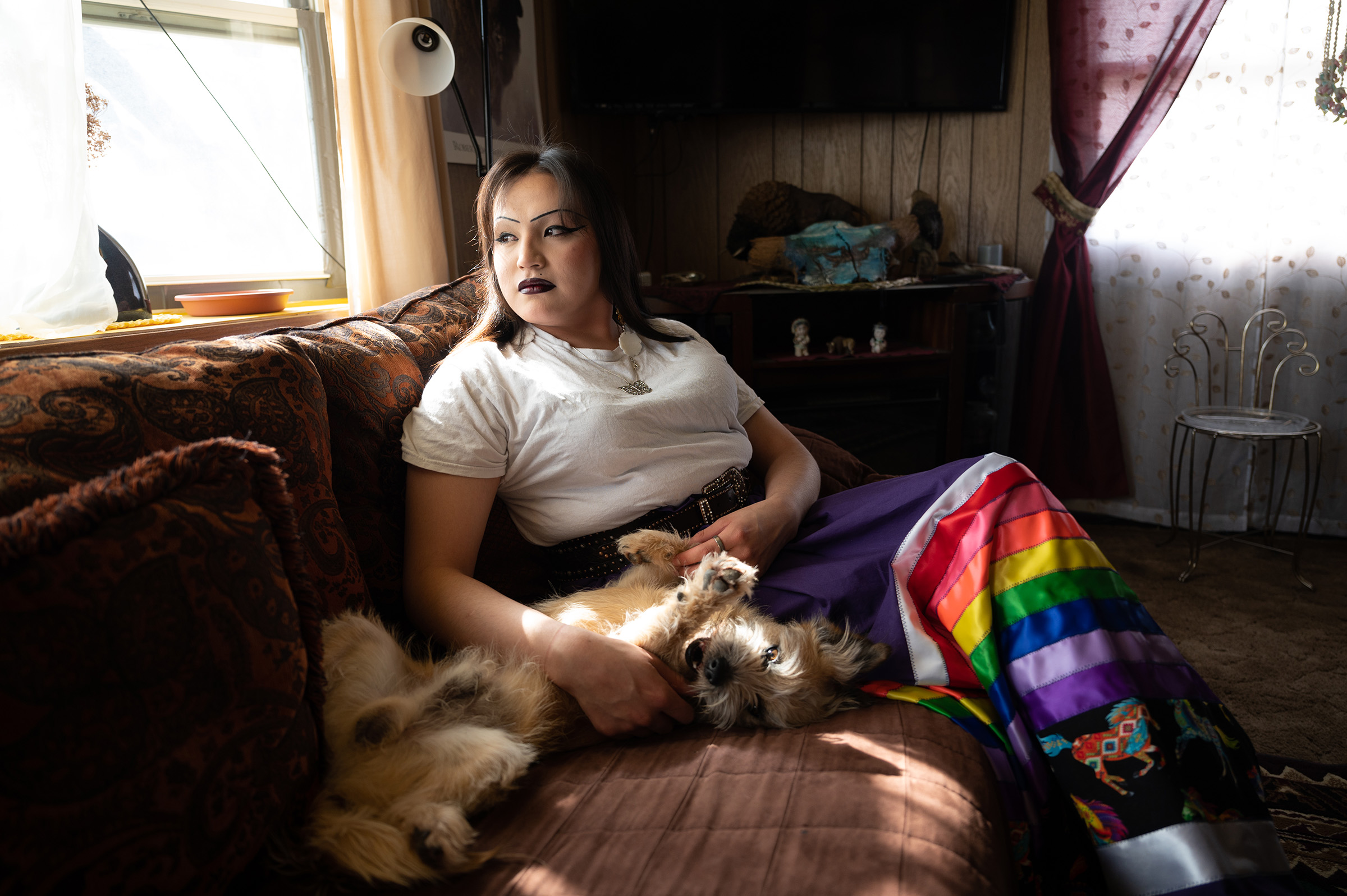
“It’s said that Two-Spirit people have always been part of the sacred circle,” Herrera said. “And once we were taken out, that circle was not complete. Until we are brought back into that circle, then you know, it will not be complete. So that’s the work that Two-Spirit societies are trying to do is complete that circle by bringing us back in.”
—
Change is beginning on the tribal government level, too.
In May 2016, the Fort Peck Executive Board passed a motion that people must use the public bathrooms correlated with the gender assigned on their birth certificate. It echoed a controversial policy passed in North Carolina two months earlier.
A tribal board member said it was to protect young girls from sharing bathrooms with men, while another said, “What people do in their bathrooms is their business. How public bathrooms are used is my business.”
The move brought national criticism from the American Civil Liberties Union and from LGBTQ+ organizations, which argued the board doesn’t understand LGBTQ+ communities within the reservation.
The resolution made Fort Peck the only reservation in the nation with such language, though in interviews with Fort Peck residents and tribal board members, most say they don’t remember it with significance. The resolution has likely gone unenforced since.
In 2021, the Fort Peck reservation became one of a few dozen tribes in the nation with provisions recognizing same-sex marriage. Before that, the tribal court was restricted from issuing marriage licenses to same-sex couples. Language in the tribal constitution defining marriage between “man and a woman” was updated to “persons” with the resolution.
Still, Fort Peck Tribal Executive Board member Roxanne Gourneau, 68, said there isn’t enough being done to recognize Two-Spirit identity on the reservation. A governing board member nearly all her adult life, she emphasized to the tribal government and the Fort Peck Tribal Cultural Resources Department that more needs to be done on education in schools in March.
“The thing that draws my attention is the freedom to be who you are,” said Gourneau, chair of the Wolf Point School Board. “You’re not stealing from somebody. You’re not coveting somebody else’s lifestyle. You just want to be you. But if you’re doing it under oppression, of trying to conceal and hide and suppressing yourself, then it just compounds to a recipe for disaster for life. My personal feeling with the schools is that we can do better.”
Gourneau’s son died by suicide in 2010. Nobody wanted to talk about the issue of suicide back then, she said. She’s since done a lot of work in bringing awareness to mental health issues and needs in the school. She believes the same should follow for Two-Spirit identities in schools where no one wants to talk about that history.
The board member went to the 12-year head of the Fort Peck Tribes Language and Culture Department for help on informing a curriculum recently. Director Ramey Growing Thunder acknowledged the historical winkte identity in the Lakota tribe, but is hesitant to teach on Two-Spirit identity.
“For me personally, Two-Spirit is a new term,” Growing Thunder said. She consulted with a high school language teacher, who told Growing Thunder that some students fit the term. However, she doesn’t identify with the term enough to comfortably teach it. “My expertise is within the language and culture. So, I can’t really elaborate on that. I am a woman leader in our culture, and my role is to take care of the women, meaning a person that was born a woman, therefore, they get the woman teachings.”
Resources for LGBTQ+ students at Wolf Point schools only include a counselor, according to Gourneau. She feels that approach makes kids question what might be mentally wrong with them.
“It doesn’t have to be a big Fourth of July change,” Gourneau said. “But something has to be done. These children hear again and again that they’re unworthy through church and elsewhere. That’s not what we should be doing. I want to be one of those people that accepts you, and that loves you for who you are.”
—
Enlarge

One such change in the reservation’s schools was the creation of a Gay-Straight Alliance at Poplar Middle School in March last year, the only such club on the reservation.
Lewis Reese is the middle school’s assistant principal. While not Indigenous, he’s worked in the schools on reservations for 16 years. He has noticed a high population of LGBTQ+ students in schools, yet they have never had a place to go.
“I have a school where it’s tough enough to be a middle school student,” Reese said. “We want to try to support them as best we can. At least they have a chance to go there to have something that speaks to them.”
The club is led in part by his son, Kyle, a transgender man. The school district’s social worker, Kyle’s counseling office looks more like a living room than a stolid school office. The room is filled with intense blue and purple lights with a mixture of frog-themed decor and Egyptian motifs. Outside the entrance of his office is the “Cool Kids Corner.” Students have pasted dozens of stickers made with his help there.
Kyle Reese, who started working at the school in 2020 while finishing up his social work degree, said he tries to come off as inviting to students as he possibly can. Part of that is through his office.
“When students come in here, they’re like, this feels like my home,” Kyle Reese said. “It’s not fun to come into an office and deal with the bright lights. This is just more inviting.”
Kyle Reese began working with a teacher at the school last year to offer more emotional support to the Gay Straight Alliance. He worked with a teacher in the middle school to shape the idea. It took a year before the group was established, but once it was formed it introduced a new safe space.
The club meets weekly with roughly seven to 15 students in attendance. However, after the recent Montana Legislature session passed a bill requiring parental consent for extracurriculars like the Gay-Straight Alliance, the group lost a few members.
“(The alliance) is about creating more diversity and opportunities within the school and the community that has not been advocated for,” Kyle Reese said. “It’s been a major work in process and obviously, there’s always a factor of everything that you try to do, you’ll face challenges. But if there’s one thing, it’s don’t give up. We got this far.”
—
Enlarge
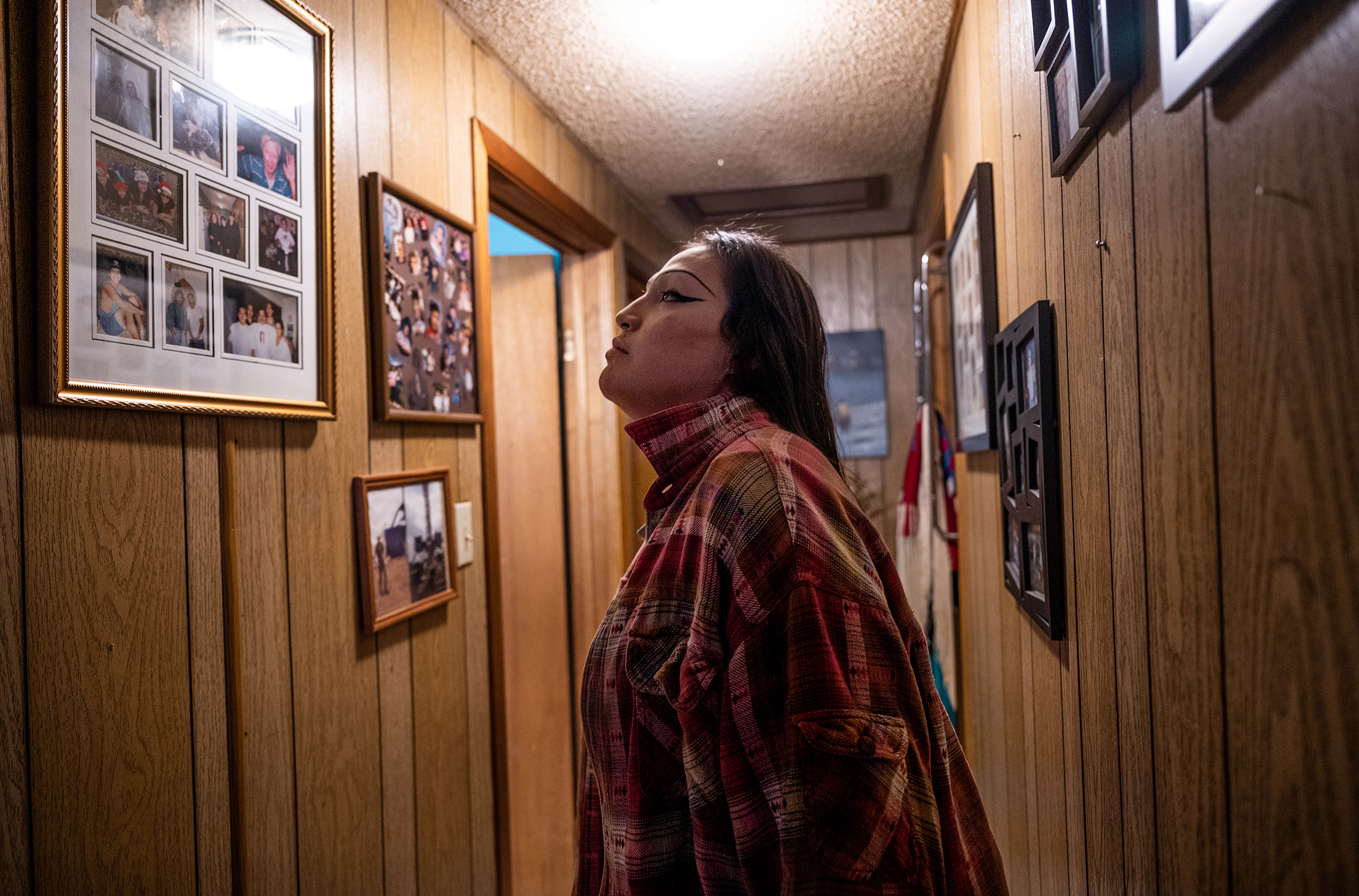
Portraits of Journey Stiffarm’s family span generations in the hallways of her grandmother’s house. Some go as far back as when the federal government and the Prebsyterians first came to the Fort Peck Indian Reservation. Others are more recent, from just a few years ago, documenting how her family has grown and persevered on the reservation all these decades.
Stiffarm applies her makeup as the portraits surround her. Her grandma initially taught her methods to apply makeup when she was 13. She’s 20 now, having graduated high school last year. Her family was always supportive of her Two-Spirit identity. One of her sisters is a lesbian and her uncle, also framed on the walls surrounding her, was Two-Spirit.
“I really didn’t ever have to come out to my dad,” Stiffarm said. “He told me that when I started wearing mascara and began fixing my hair that I should be whoever I want to be. That I should always embrace it.”
Enlarge

However, outside her family, life was more difficult growing up. Stiffarm grew up on the reservation in neighboring Wolf Point, 22 miles west of Poplar. Members of the Fort Peck Two-Spirit Collective said discrimination is more prominent with fewer Indigenous people residing there. In third and fourth grade, Stiffarm was bullied for her long hair. In Sunday school, as the teacher told students that God makes no mistakes, students instead looked at her.
She got tired of not fitting in, leaving for a boarding school in Oklahoma in middle school. “That’s where I really became who I wanted to be,” Stiffarm said.
However, Stiffarm eventually returned to the reservation and Wolf Point after COVID-19 shut down the boarding school. And then the stares returned too, with her finishing the final grades of high school remotely.
Her return home would ultimately lead to fights at parties and Stiffarm being jumped while out in public. She prefers staying home with her grandmother now. Partially because of her difficult experience, she’s considering leaving Fort Peck for college in Kansas.
“I can actually be myself in the city without worrying about getting beat up or getting mugged,” Stiffarm said.
Stiffarm’s challenging experience on the reservation is not unique. In a 2021 study by the UCLA, 81% of Indigenous LGBTQ+ people reported experiencing everyday forms of discrimination in the past year and 57% reported experiencing physical or sexual assault at some point as an adult.
Ultimately, leaving the reservation would mean leaving her family behind again.
Her and her family’s prayer ties around cottonwoods, used for wishing good health and prosperity have since faded next to the house where she grew. For better or worse, memories of living on the reservation haven’t faded, though.
Enlarge
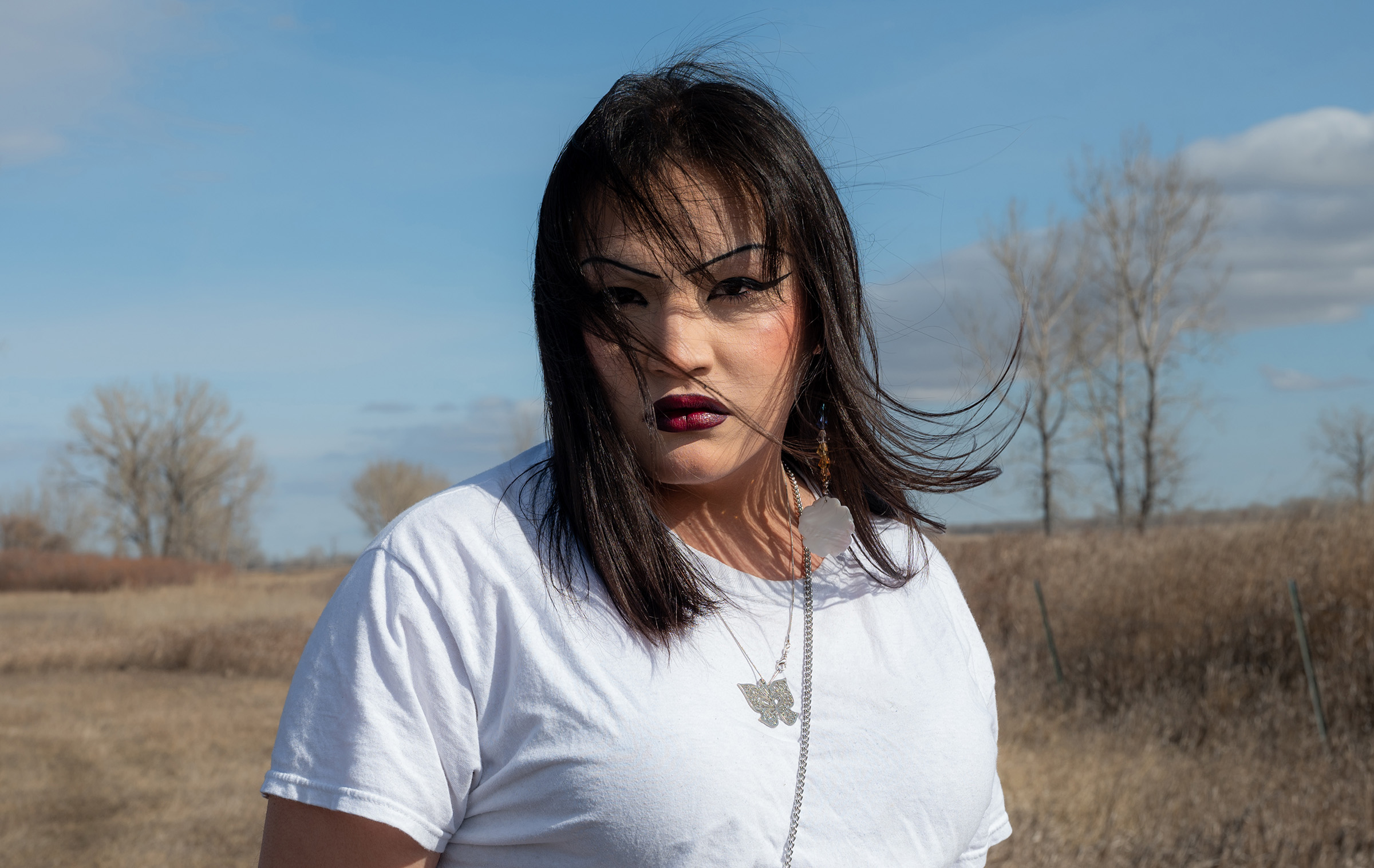
In expansive grass fields next to the cottonwoods, she remembers playing tag with her sisters as a child. The grass would grow so tall in the summers they would be hidden from passersby on the dirt road next to them. A mile down the road is the Missouri River, where she used to camp with her dad. She still points out the logs they used as a windbreaker for campfires, though it’s been years since she last camped at all.
She said her definition of family goes beyond immediate relations, though.
“I came to boarding school as a stranger, but in the process we had a family form,” Stiffarm said. “It’s people who are there for you and who support you and love you for who you are.”
—
In 2022, Teague formed the Fort Peck Two-Spirit Collective in the wake of a non-tribal citizen’s transphobic post on Facebook that went viral through the community. The post made them feel sick and unsafe in their community. Teague wanted to retaliate and respond to the post. Instead, they used that energy to bring people together.
The collective had the first pride event on the reservation last June during Pride Month. Teague, the organizer, considered it an amazing experience. It almost felt like the whole community got behind them, which surprised them.
The tribal college hosted the space for them in the gym. Tribal Headstart donated decorating materials. The Fort Peck Journal ran the group’s announcements and a local caterer provided food, both for free.
Enlarge
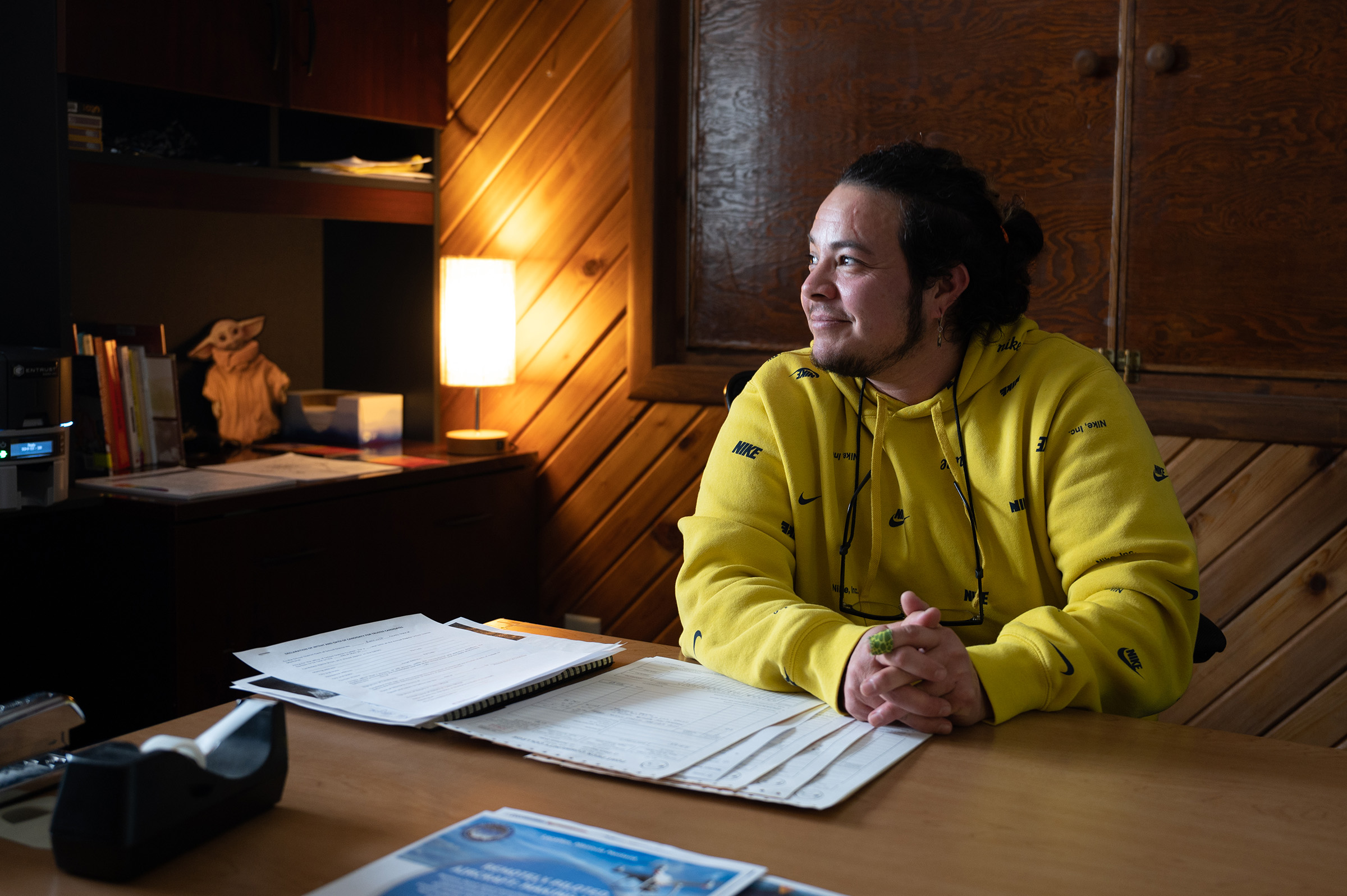
In the end, more than 60 people came to the prom, ranging from children to people in their 50s. The college gym was turned into a night sky that evening. Stars glowed in the dark with galaxy lights projecting constellations onto the ceiling. Neon clouds floated along the walls.
Teague, who is Mescalero Apache and Hunka Dakota, described it as a special moment for everyone, bringing people together at an event where they all felt safe. When “Bohemian Rhapsody” by Queen boomed from the speakers that night, the DJ joked no one would remember the song, yet the entire room came to life and sang the song lyric by lyric.
“I remember thinking this doesn’t happen,” Teague said. “I’ve never been to a party like this. Something that was full of a bunch of queers and trans and Two-Spirit people and their parents and their relatives. And yet everybody was standing in a circle singing this song.”
And now, Teague hopes to continue more events for Two-Spirit people this summer. They are working to have Montana’s first transgender Rep. Zooey Zephyr (D-Missoula) to meet with tribal representatives and the LGBTQ+ community for another pride event.
“We have people that have just become more of who they are,” Teague said. “And you can see the change. You can see people that were hiding are visible now.”
A SPECIAL PROJECT BY THE UNIVERSITY OF MONTANA SCHOOL OF JOURNALISM
ADDITIONAL FUNDING SUPPORT FROM THE GREATER MONTANA FOUNDATION
READ MORE:
Previous
Surrounded by Séliš
Next
Breach of Trust
